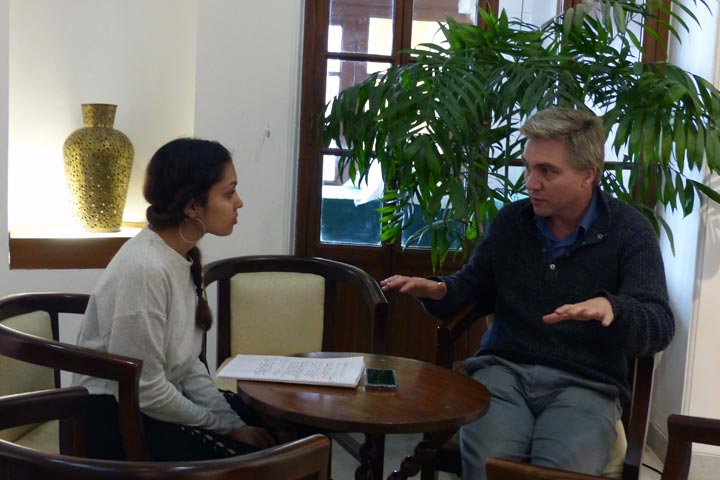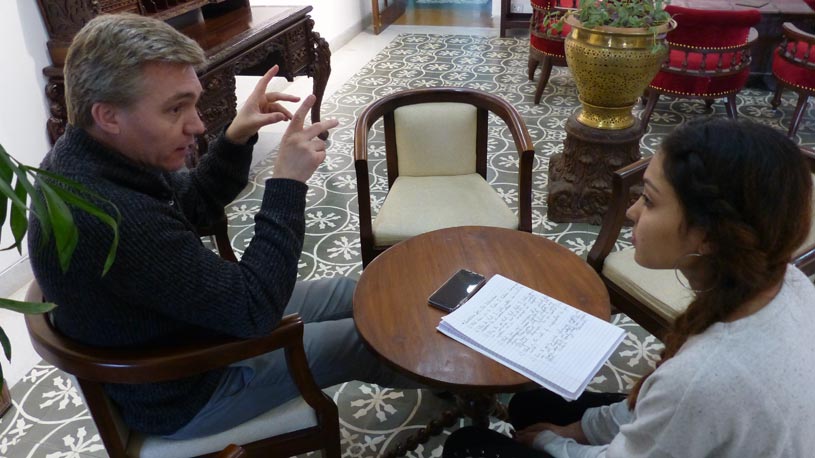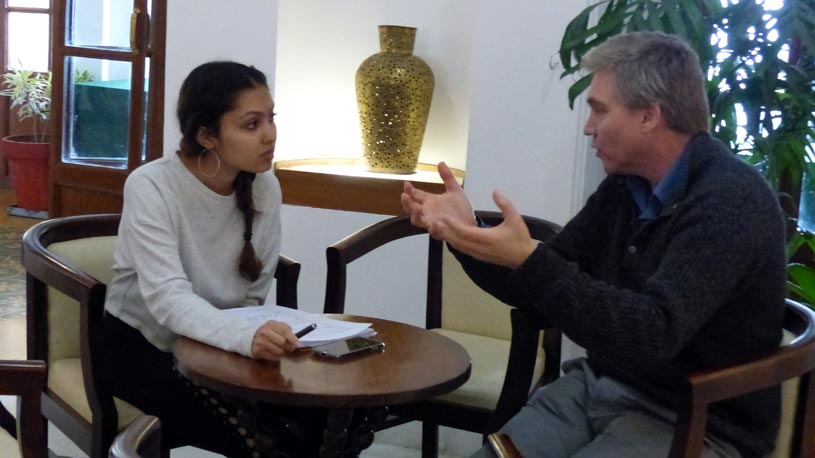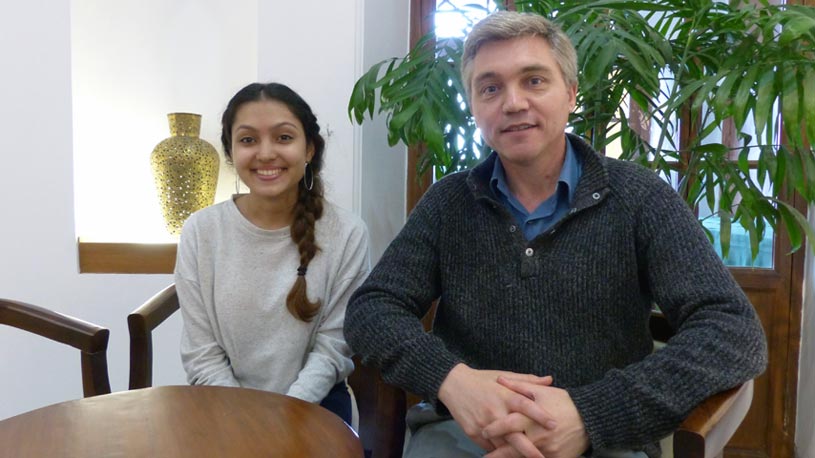
09 Aug Dr Delacy’s India
Shatakshi Kabi, Woodstock student and Centre for Imagination Intern, interviews our resident scholar Richard Delacy.
Where in the world is India?
Where is India? Looking at a world map, one would say with utmost confidence that it is located in the South-Central Asia and lies between latitudes 20° 0′ N, and longitudes 77° 00′ E. An excellent job at defining this land’s existence on this planet through its boundaries. But where can we actually find this country? The answer definitely ceases to lie in something as definite as a world map.
I found India while walking around the local streets of Mussoorie and being constantly interrupted by eager attempts made by every vendor I passed to get me to spend a few notes from my pocket. I found it in the man asking for extra chutney in his vada pav while using his briefcase as an umbrella to shield his snack from the heavy outpour of Mumbai. I also caught a glimpse of it in the people who went bonkers with hoots and whistles when Shahrukh Khan spread his arms and danced to a Hindi song. You might find India in a 20-year-old lady on the 45th floor of a building in New York City when she says “Maa, aapki bohot yaad aati hai” (“Mom, I really miss you”) on her phone. This is where India actually resides. In the language that Indians connect through with each other. If you search carefully, you’ll find fragments of India all over this world. One of these fragments lies in Harvard University as well where Dr. Richard Delacy teaches Hindi and Urdu as an elective to the students studying over there. Fortunately, he is at Woodstock currently as a visiting scholar for the Indian Culture week in order to share his experience and perspectives on Indian languages and their significance. I was lucky enough to have the chance to speak with him about his India.
 What drew you to India and Indian languages?
What drew you to India and Indian languages?
“Initially, I studied in Sri Lanka for one year when I was seventeen, so that sparked my interest in South Asia, and then travelled around India a little bit as a tourist. I found that interesting because most of the places I visited and the people I met were tourists and they, like me, didn’t have much knowledge about India. Therefore, in order to gain a greater understanding, I figured that I’d have to know a language and start to study more deeply about Indian society and its culture. So I started studying Hindi at the undergraduate level for three years in Australia, followed by a Masters, and then I had the opportunity to teach a little bit. Something that became really important to me was the way one interacted with a place being an outsider, how he/she was perceived and what sort of cultural identity they had in that sense. Especially for immigrants who don’t necessarily see themselves as part of the culture in India, this proves to be an insight into people’s lives. But I think this was a valuable way to increase my understanding on people’s experiences.”
Why do you think Hindi and Urdu specifically matter so much out of all the other languages?
“Well, that’s a very complex question. The short answer is that they matter politically. They matter because Hindi is the joint official language of India and it’s the same with Urdu in Pakistan. Therefore, they clearly have state sponsorship. Now, in terms of sheer numbers, Hindi has by far the most number of speakers as a first language and as a second language. Therefore it is a fair argument to make if you say that there is a broad number of Hindi speakers within the country along with English. Due to this significance, this language has also has had the greatest amount of resources dedicated to producing ways to teach and to learn it which makes it easier for people to study it. The same goes for Urdu as well.
“Another way to perceive it is that this world has a complexity and richness to it and just by knowing a narrow fragment of it like English or English words doesn’t really give you access to all of that. What you end up doing is that you start living in parallel worlds. I can live in a world where I’m surrounded by Hindi and just tune it out because I don’t know it but I’m actually tuning out half of the world. So in a way, the importance of it comes from the fact that the social world is much more complicated and languages exist on this continuum. I think India has this whole continuum where language is fluid and where most of the languages spoken are part of the same world. Also, it is true to say that one of the dominant forms of speech and communication comes under the rubric of Hindi.”
What is the role of imagination in the work that you do?
“Well, imagination is a complicated concept. I feel that the human imagination is limited in terms of the fact that it builds on that which has come before. In the sense, you can’t imagine something in a vacuum or in isolation. The fact is that one has to recognise that imagination is something that we privilege. Nothing can be imagined outside of a social context so to actually push thinking beyond the frameworks that we use is not so easy. It’s important to think that everything that we imagine has a broader social dimension to it and that it’s hard to break out of that social framework while imagining an ideal, which limits our imagination to a certain degree.”
 What has your experience at a multicultural school such as Woodstock been like, where people come from different parts of the world and speak so many different languages?
What has your experience at a multicultural school such as Woodstock been like, where people come from different parts of the world and speak so many different languages?
“I’ve had a very interesting experience and I find it quite complex as people come from all over to work and to teach here and so everyone has different perspectives about India. It’s interesting to get people’s view on education in this country and what this school seeks to do and things like that which I didn’t know much about. But there are different people who fit into this community in different ways. People like the guards or the staff here who are not teachers have a very distinctive perspective on things and I like to observe that and hear what they have to say. I do find Woodstock to be a world unto itself, in a way, because it’s quite a small and closed community which makes it pretty fascinating for me. In addition to that, the people here who come from foreign countries, more or less interact with the world outside Woodstock according to how comfortable they feel. I’ve met some people who find comfort in just staying here and teaching and then there are other people who want to explore more of the outside world. I’ve spent my entire time in India in that outside world which has been a unique experience for me.”
How is your work influencing your students at Harvard?
“I think in two ways. The first thing is that English is an incredibly privileged language in India and so students who attend my classes often come from South Asian backgrounds. What I teach is an elective, therefore the people who come to study it usually have an interest in South Asia or they originate from there. One motive I have is to push the students coming from a South Asian background to think beyond their own understanding of their language. Also, being a person who does not originate from India and who teaches a language that I did not grow up speaking, prompts people to break their perception and think that there are different ways of speaking Hindi and understanding it.
“In order to expand my knowledge about the language, I’ve spent a lot of time in Uttar Pradesh where a lot of my students wouldn’t prefer to go even if they originate from India. I want them to push their understanding of what it means to learn a language and to make them invest a bit of their time to see that there are hidden values in things which they might not be able to decipher immediately. English does have a terribly utilitarian value attached to it, but that is not the only way to look at the world.
"I do think that it’s important to demonstrate that you’re making an investment and language is the easiest way to do that."
“In a broader sense what I try to do is to help them see that seemingly non-utilitarian languages like Hindi and Urdu also have a significant value to them. For the kids who come from a South Asian background, I hope to inspire them to want to come to India and to spend time here and realise that it’s an incredibly dynamic society. There are so many ways that you can be in this country and work, meet people and learn about India’s history and culture and knowing its language gives you direct access to that. If you come here as a foreigner who doesn’t know any South Asian languages, you are perceived in a particular way and this happens to many other people who go to other countries where their language isn’t spoken.
“The first perception that people have of you is that you might not know anything about that place, which is natural. But if you want to be taken seriously as a person who wants to come to India and hasn’t been born or brought up here then language will make a remarkable difference to that. I have realised many times over the 35 visits I’ve made to India that people have treated me with so much more seriousness and that’s because of the effort that they perceive I’ve made to learning Hindi-Urdu. And I do think that it’s important to demonstrate that you’re making an investment and language is the easiest way to do that.”

Uplifting the value of Indian heritage
I don’t even remember the last time I had a proper conversation in Hindi with anyone after coming to Woodstock which is something I’m actually ashamed of now after listening to Dr. Delacy’s perception of this language. This whole conversation gave me an extremely significant insight into how pivotal this language, which I was brought up in, actually is in terms of my identity as someone originating from India. It is what makes me a fragment of this country. Interacting with people like Dr. Delacy who are working towards uplifting the value of Indian heritage has been an extremely inspirational experience for me. The reason for this being that it has made me believe that being an Indian, I have more of a responsibility to work towards sustaining and strengthening all the roots that gave birth to my country and preventing them from getting lost in the gushing flood of globalization. In Dr. Delacy’s words, “Life has a lot of mundane aspects to it but if you can find something that really does spark your interest or really does make you question your place in the world in a meaningful way, you will never be bored.” Therefore, with something like this to work towards, I hope I’ll never be bored.
Shatakshi Kabi, Woodstock student and Centre for Imagination Intern
Find out more about the Centre for Imagination here.






No Comments